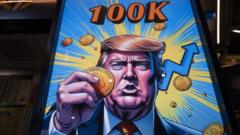Following the announcement of his new cryptocurrency on Truth Social, former President Donald Trump has introduced the $Trump coin, aimed at celebrating his political persona just before his inauguration as the 47th president of the United States. Coordinated through CIC Digital LLC, an affiliate of the Trump Organization known for its celebrity branding ventures, the launch raises significant questions about the implications of blending politics with profit.
On its first day, the value of the $Trump coin skyrocketed, achieving a market capitalization of nearly $5.5 billion as indicated by CoinMarketCap.com. The venture involves the release of 300 million tokens, with 200 million already issued and an additional 800 million planned over the next three years. The associated website proclaimed the meme coin as a tribute to Trump's steadfastness amid challenges. However, it also clarified that the coin is "not intended to be" tied to any investment or political enterprise.
Critics have raised alarms about the ethical dimensions of this launch, particularly alleging that Trump is monetizing his political position. Crypto expert Nick Tomaino labeled the venture "predatory," warning that those who invest in such volatile digital coins could face severe financial losses as speculation drives prices. This scrutiny is exacerbated by the unstable nature of the meme coin market, where hype can inflate values rapidly before a significant drop occurs.
The crypto community remains cautiously optimistic about the future of cryptocurrency under Trump's administration, given the historical impetus from his previous statements advocating for a robust crypto economy in the U.S. In contrast, the Biden administration has taken a more cautious approach, emphasizing regulatory oversight to combat fraud and illicit activities within the crypto market.
As $Trump navigates the volatile world of cryptocurrencies, it raises a pivotal question: to what extent should political figures engage in ventures that could syphon public interest towards their financial gain?
On its first day, the value of the $Trump coin skyrocketed, achieving a market capitalization of nearly $5.5 billion as indicated by CoinMarketCap.com. The venture involves the release of 300 million tokens, with 200 million already issued and an additional 800 million planned over the next three years. The associated website proclaimed the meme coin as a tribute to Trump's steadfastness amid challenges. However, it also clarified that the coin is "not intended to be" tied to any investment or political enterprise.
Critics have raised alarms about the ethical dimensions of this launch, particularly alleging that Trump is monetizing his political position. Crypto expert Nick Tomaino labeled the venture "predatory," warning that those who invest in such volatile digital coins could face severe financial losses as speculation drives prices. This scrutiny is exacerbated by the unstable nature of the meme coin market, where hype can inflate values rapidly before a significant drop occurs.
The crypto community remains cautiously optimistic about the future of cryptocurrency under Trump's administration, given the historical impetus from his previous statements advocating for a robust crypto economy in the U.S. In contrast, the Biden administration has taken a more cautious approach, emphasizing regulatory oversight to combat fraud and illicit activities within the crypto market.
As $Trump navigates the volatile world of cryptocurrencies, it raises a pivotal question: to what extent should political figures engage in ventures that could syphon public interest towards their financial gain?





















